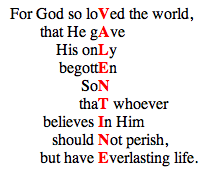I am constantly amazed at the love that God has for us. You may feel love from your family or friends, but nothing on this earth compares to how much your Heavenly Father loves you. Of course, there will be some of you who don’t feel that from anyone, and so it will be even harder for you to fathom, but I hope that today’s verses will help.
In Luke 15:3-7 Jesus tells the parable of the lost sheep, which is actually just the first part of the three part parable told in Luke 15. It was in response to an accusation from the Pharisees and experts in the law who were accusing Jesus of socializing with “sinners” (Luke 15:1-2), something that just wasn’t done by upstanding Jewish men. Talk about bullying. You can’t associate with her because she’s from the wrong side of the tracks. He’s not cool enough; what are you talking to him for? To be honest, it was more like he is not noble enough so he is not worthy of your attention, but it made me think of a schoolyard bully. Jesus, however, gave His attention to the most despised of society, and He called the Pharisees hypocrites. (Matthew 23:13) In reality, the Pharisees were just as lost as the rest of the “sinners”, but they were in denial, and refused to see their need for Jesus.
The shepherd in the parable believes that one sheep out of a hundred, one per cent of the flock, is worth searching for. What did he have to go through to find that sheep? Did he have to cross streams, climb rocky crags, crawl through thick brush? When he finds the sheep, it is obviously too weak or tired or hurt or confused to find its way home on its own. He picks it up and carries it home on his shoulders. Was one sheep out of a hundred worth that effort? Yes. Jesus feels that way about us. Every one of us is worth enough that Jesus gave up His life for us. His search for us took Him to the cross. There is no greater love than that.

